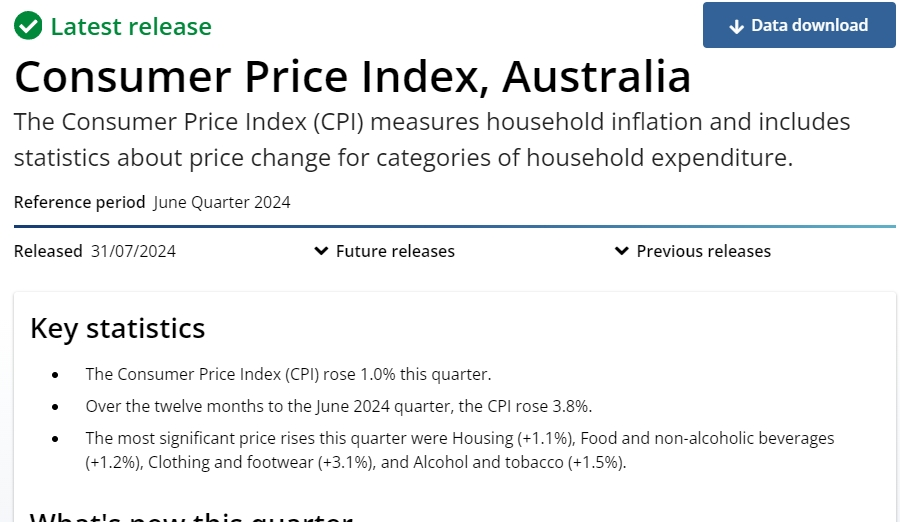Australia's inflation eased in the second quarter and a rate hike is still possible in the future
The Reserve Bank of Australia has stated that if the inflation rate does not reach the target range of 2-3% by the end of 2025, it will act without hesitation.
On July 31st, Australia revealed the much-anticipated core inflation for the second quarter, with the trimmed mean rising by 3.9%, better than the first quarter's 4%. Concurrently, Australia's overall CPI for the second quarter increased by 3.8% year-on-year, in line with market expectations.

In the first quarter, Australian inflation unexpectedly declined, and the Reserve Bank of Australia anticipated a gradual slowdown in prices, opening the door for a rate cut. Following the release of this data, the Australian dollar fell by 0.8% at one point, and the yield on three-year Australian government bonds plummeted by 18 basis points. Currently, traders estimate that there is a 50% chance of the Reserve Bank of Australia cutting rates in February.
Regarding these figures, Alvin Tan, Head of Asian Foreign Exchange Strategy at RBC Markets, stated that the low CPI in Australia for the second quarter, especially the core CPI, could lead to a sell-off by Australian dollar bulls. Nevertheless, inflation in Australia remains high, and these figures only ease the pressure but are not sufficient for the Reserve Bank of Australia to start cutting rates immediately.
Looking specifically at this data, the largest contributor to Australia's second-quarter inflation was the food and non-alcoholic beverages sector, with a price increase of 1.2%; followed by the housing sector, with a price increase of 1.1%.
Additionally, fruit and vegetable prices also experienced an uptick in the second quarter due to "unfavorable growing conditions leading to a reduction in grapes, strawberries, blueberries, tomatoes, and other fruits." The Australian Bureau of Statistics indicated that the country's fruit and vegetable prices set a new high for quarterly increases since 2016.
The price of non-tradable goods rose by 5% year-on-year, consistent with the first quarter.
Analysis suggests that this report will strengthen the Reserve Bank of Australia's confidence in lowering prices, with employment expected to continue growing until the economy achieves a soft landing.
From August 5th to 6th, the Reserve Bank of Australia will hold a monetary policy meeting and announce the latest economic forecasts and interest rate decisions on the following Tuesday. Australia's recent economic data has been robust, with retail sales and employment stronger than expected before the release of this CPI data, and business activity remaining resilient.
Unlike other developed countries, Australia has been cautious in its past rate increases. Concerned about domestic households' ability to repay loans under high interest rates, the Reserve Bank of Australia's pace of rate hikes has been slow, unlike the Federal Reserve's haste. Relevant sources have indicated that, even so, following this trend, Australia is also expected to achieve a 2% inflation target as early as next year.
However, the recent strong performance of the economy and some price data has raised questions about whether the policy is strict enough. The Reserve Bank of Australia has stated that if the inflation rate does not reach the target range of 2-3% by the end of 2025, it will act without hesitation.
Last month, Reserve Bank of Australia Governor Michele Bullock also reiterated that although the bank has maintained the benchmark interest rate at a 12-year high of 4.35%, the interest rate setting committee has not ruled out the possibility of further rate hikes in the future.
·Original
Disclaimer: The views in this article are from the original Creator and do not represent the views or position of Hawk Insight. The content of the article is for reference, communication and learning only, and does not constitute investment advice. If it involves copyright issues, please contact us for deletion.